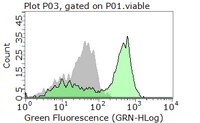ABF114 Sigma-AldrichAnti-MSR1/CD204 Antibody
Anti-MSR1/CD204 is an antibody against MSR1/CD204 for use in WB, FC.
More>> Anti-MSR1/CD204 is an antibody against MSR1/CD204 for use in WB, FC. Less<<Recommended Products
Overview
| Replacement Information |
|---|
Key Spec Table
| Species Reactivity | Key Applications | Host | Format | Antibody Type |
|---|---|---|---|---|
| H, M | WB, FC | Rb | Affinity Purified | Polyclonal Antibody |
| References |
|---|
| Product Information | |
|---|---|
| Format | Affinity Purified |
| Presentation | Purified rabbit polyclonal in buffer containing 0.1 M Tris-Glycine (pH 7.4), 150 mM NaCl with 0.05% sodium azide. |
| Quality Level | MQ100 |
| Physicochemical Information |
|---|
| Dimensions |
|---|
| Materials Information |
|---|
| Toxicological Information |
|---|
| Safety Information according to GHS |
|---|
| Safety Information |
|---|
| Storage and Shipping Information | |
|---|---|
| Storage Conditions | Stable for 1 year at 2-8°C from date of receipt. |
| Packaging Information | |
|---|---|
| Material Size | 100 µg |
| Transport Information |
|---|
| Supplemental Information |
|---|
| Specifications |
|---|
| Global Trade Item Number | |
|---|---|
| Catalogue Number | GTIN |
| ABF114 | 04055977115970 |
Documentation
Anti-MSR1/CD204 Antibody SDS
| Title |
|---|
Anti-MSR1/CD204 Antibody Certificates of Analysis
| Title | Lot Number |
|---|---|
| Anti-MSR1/CD204 | Q2482745 |
| Anti-MSR1/CD204 - 3174751 | 3174751 |
| Anti-MSR1/CD204 - 3903317 | 3903317 |








